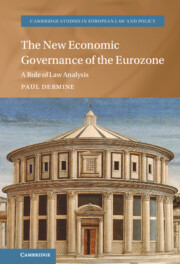Book contents
- The New Economic Governance of the Eurozone
- Cambridge Studies in European Law and Policy
- The New Economic Governance of the Eurozone
- Copyright page
- Dedication
- Contents
- Series Editors’ Preface
- Foreword by the Supervisors
- Acknowledgments
- Table of Cases
- Abbreviations
- Introduction
- Part I The New Economic Governance of the Eurozone
- Part II The New Economic Governance of the Eurozone: A Rule of Law Analysis
- 3 The New Economic Governance of the Eurozone and the Competence Allocation System of the EU
- 4 The Internal Quality of the New Economic Governance of the Eurozone: The Case of Fiscal Policy Rules
- 5 The New Economic Governance of the Eurozone and the (Im)Possibilities of External Review
- 6 The New Economic Governance of the Eurozone and the Sustainability of EU Fundamental Rights
- Conclusion: The Rule of Law, the Role of Law and Economic Governance in the Eurozone
- Bibliography
- Index
5 - The New Economic Governance of the Eurozone and the (Im)Possibilities of External Review
from Part II - The New Economic Governance of the Eurozone: A Rule of Law Analysis
Published online by Cambridge University Press: 14 July 2022
- The New Economic Governance of the Eurozone
- Cambridge Studies in European Law and Policy
- The New Economic Governance of the Eurozone
- Copyright page
- Dedication
- Contents
- Series Editors’ Preface
- Foreword by the Supervisors
- Acknowledgments
- Table of Cases
- Abbreviations
- Introduction
- Part I The New Economic Governance of the Eurozone
- Part II The New Economic Governance of the Eurozone: A Rule of Law Analysis
- 3 The New Economic Governance of the Eurozone and the Competence Allocation System of the EU
- 4 The Internal Quality of the New Economic Governance of the Eurozone: The Case of Fiscal Policy Rules
- 5 The New Economic Governance of the Eurozone and the (Im)Possibilities of External Review
- 6 The New Economic Governance of the Eurozone and the Sustainability of EU Fundamental Rights
- Conclusion: The Rule of Law, the Role of Law and Economic Governance in the Eurozone
- Bibliography
- Index
Summary
Chapter 5 investigates the availability of external review under the new economic governance of the Eurozone. It shows that the transformation of the EU’s powers in the economic and fiscal fields have not come together with a parallel intensification of judicial scrutiny by the Court of Justice. It also finds that, considering the Court’s current case law and the conceptual frameworks that continue to structure its action (starting with the concepts of challengeable act and legal effects or the rules on standing) a shift in approach is quite unlikely. The result is a profound disconnect between the evolving nature of law and governance in the realm of EU economic policy and its judicial apprehension by the Court of Justice, an inappropriate level of review and a widening accountability gap. It notes that several bodies have sought to instil a certain dose of review, without compensating the lack of judicial review however. It enjoins the Court to lift the constitutional uncertainty produced by the new economic governance of the Eurozone, to come to terms with what standard economic governance has progressively become and to make sure that supranational judicial scrutiny keeps up with the evolving powers of the EU.
Keywords
- Type
- Chapter
- Information
- The New Economic Governance of the EurozoneA Rule of Law Analysis, pp. 212 - 278Publisher: Cambridge University PressPrint publication year: 2022

